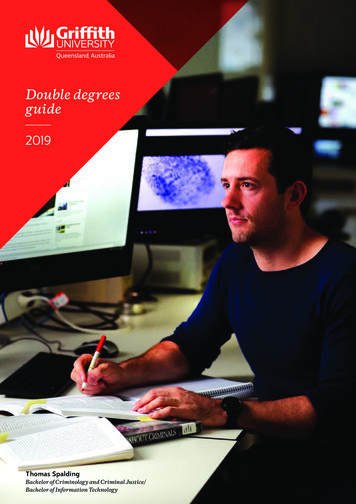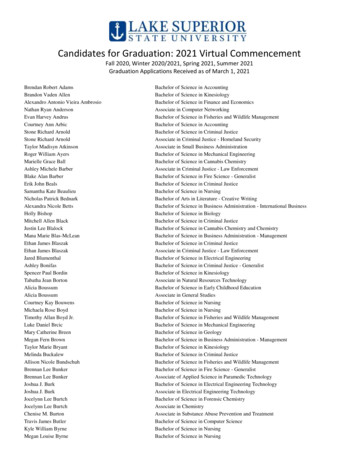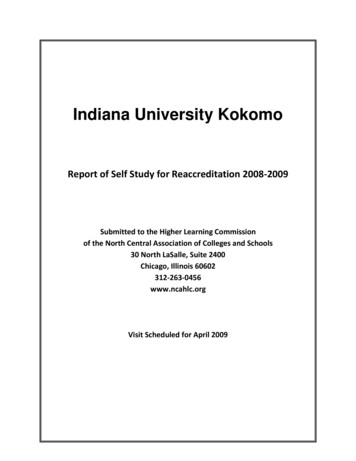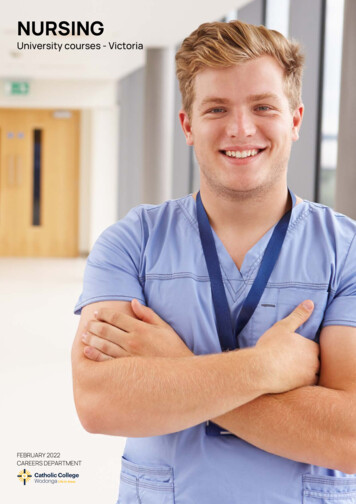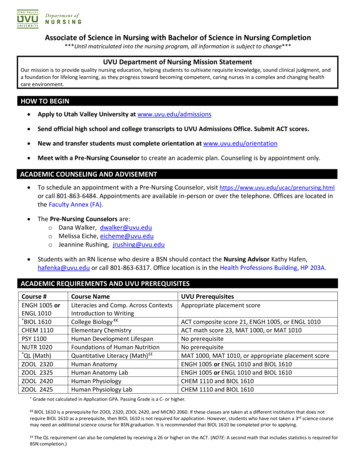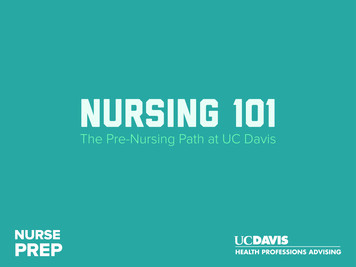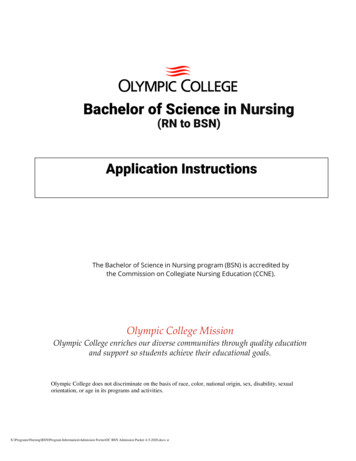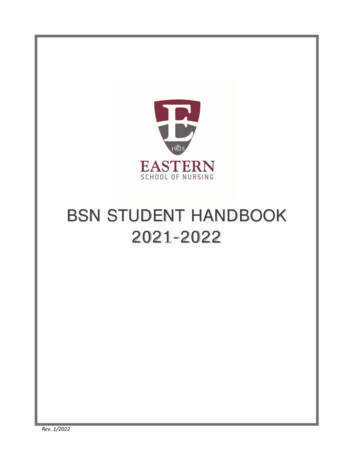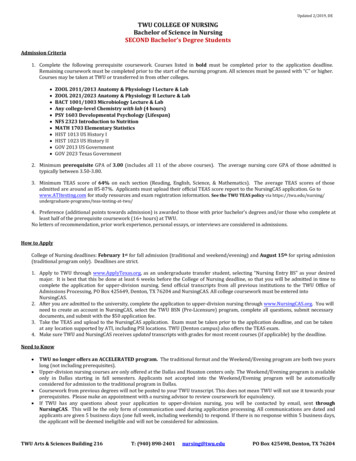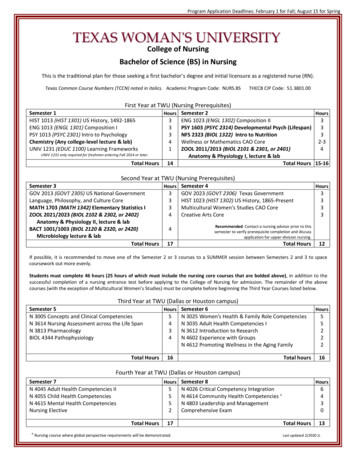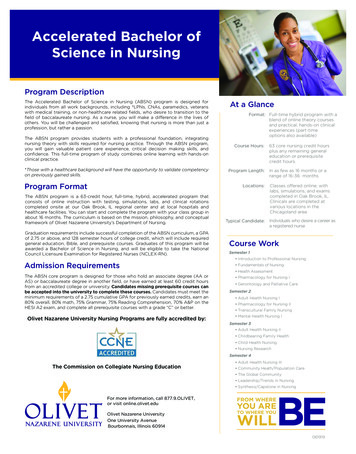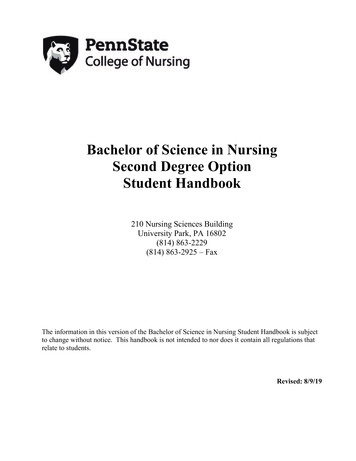
Transcription
Bachelor of Science in NursingSecond Degree OptionStudent Handbook210 Nursing Sciences BuildingUniversity Park, PA 16802(814) 863-2229(814) 863-2925 – FaxThe information in this version of the Bachelor of Science in Nursing Student Handbook is subjectto change without notice. This handbook is not intended to nor does it contain all regulations thatrelate to students.Revised: 8/9/19
Table of ContentsWELCOME FROM THE DEAN1WELCOME FROM THE ASSOCIATE DEAN FOR UNDERGRADUATE EDUCATION2COLLEGE OF NURSING CONTACT INFORMATION3COLLEGE OF NURSING4Mission4Vision4Core Values4Philosophy4Beliefs About Learning/Nursing Education6ACCREDITATION8COLLEGE OF NURSING COMMITTEES8END OF PROGRAM LEARNING OUTCOMES9UNDERGRADUATE NURSING PROGRAM ACADEMIC POLICIES10Standards Of Conduct10Academic Integrity Statement10Class And Clinical Attendance Policy10Essential Functional Standards Required For Clinical Practice11ExamSoft Policy17Testing Session Procedures19Educational Equity20Disability Statement20Diversity Statement21Policy For Requesting Student Records21ACADEMIC ADVISING22Academic Adviser22Counseling And Psychological Services (Caps)24Additional Student Resources25UNDERGRADUATE NURSING PROGRAM CURRICULUM26Nursing Academic Requirements/Degree Audit26Math Policy For Pre-Licensure Students27Recommended Academic Plan29Nursing Course Requirements And Course Descriptions30Clinical Capstone33
Clinical Preceptor EvaluationAssessment Technologies Institute (ATI)3435ATI Placement in the 2nd Degree B.S.N. Curriculum38ATI Plan – Getting Started with ATI41Course And Clinical Scheduling43Undergraduate Program Enrollment43Re-Enrollment/Re-Entry/Delay in Program Progression Policy43Prior Learning and Transfer Credit45CLINICAL COMPLIANCE REQUIREMENTS46Timeline for Year One48Timeline for Year Two50Process If Not Compliant52Compliance Requirements (CR) #1-1353CR #1: Student Notification of Program Requirements Form53CR #2: Student Consent for Release of Information to Authorized Third Parties53CR #3: Confidentiality, Safe Environment and Fiction Contract for Nursing Simulation 53CR #4: Entrance Health Exam Form53CR #5: Personal Health Insurance54CR #6: Liability/Malpractice Insurance54CR #7: Cardiopulmonary Resuscitation (CPR) Certification54CR #8 - #10: Clearance Checks55General Information55CR #8: PA Child Abuse History Clearance (Act 151)55CR #9: PA Criminal Record Check (Act 34)55CR #10: Federal Criminal History Clearance (Act 73) and Fingerprinting (Act 171)57CR #11: Student Data Form59CR #12: Influenza (Flu) Immunization60CR #13: Drug Testing60Compliance Requirement Forms61CLINICAL POLICIES73Precluded Students From Clinical Institution73Patient Care73Clinical Safety Policy73Impaired Student Nurse Policy74Infectious Disease Policy80
Return To Clinical81Student Pregnancy Policy81Transportation To And From Clinical Agencies Policy81Student Dress Code Policy81Social Media Policy83Use Of Electronic Devices In Clinical Policy84Clinical Cancellation Guidelines85Simulation Laboratory Practice Option85Clinical Failure Policy85Guidelines For Using The Clinical Evaluation Tool And Remediation Form86ACADEMIC SUCCESS87Definition of Grades87College of Nursing Grading Scale87Nursing Course Examination Rounding Policy87Academic Success Program88Academic Success Plan:90Academic Progression90Student Academic Difficulty91Plan for Early Identification of Academic Difficulty and Follow-up91Academic Grievance Procedures92Grade Mediation And Adjudication92NURSING OPPORTUNITIES93Protocol For Students Who Seek Outside Employment93Penn State Alumni Association / College Of Nursing Alumni Society93PROFESSIONAL CAREER DEVELOPMENT94National Student Nurses’ Association94Student Nurses’ Association Of Penn State (SNAPS)94SIGMA THETA TAU INTERNATIONAL SOCIETY OF NURSING96Beta Sigma Chapter Membership96Sigma Theta Tau Achievement Award96SCHOLARSHIPS AND AWARDS97GRADUATING SENIORS: NCLEX EXAMINATION and RN LICENSURE98Information For Graduating Seniors98Complete the Post-Graduation Contact Survey98Register for National Council Licensure Examination (NCLEX)98
Submit Application for Licensure to ONE State98Submit Application for Temporary Practice Permit (TPP)98Licensure Process100Licensure – Pennsylvania100Licensure - States Other Than Pennsylvania100Confirmation101Helpful Tips and Notes101RESOURCESLinks To Other Important InformationINDEXClinical Performance Evaluation Remediation Forms Index103103106106NURS 230 Student Clinical Performance Evaluation106NURS 251 Student Clinical Performance Evaluation112300 LEVEL Student Clinical Performance Evaluation118400 LEVEL Student Clinical Performance Evaluation124Academic Success Plan Index130Academic Success Plan Process – Course Exam Grade 77%130Clinical Success Plan Process – Clinical Skills134Academic Success Plan - General136
WELCOME FROM THE DEANWelcome to the Second Degree Bachelor of Science in Nursing (BSN) program at the Penn StateCollege of Nursing! Your choice of the nursing major represents a significant commitment on yourpart, and we hope that you find your studies personally satisfying.Penn State is a world-class university, with world-class resources. I encourage you to take advantageof the many learning opportunities provided by our Penn State community. Know that our faculty andstaff stand ready to help you succeed and to cheer you on.Best wishes for a successful program of study in the College of Nursing. The future of nursing will bein your capable hands---make us Penn State proud!Be Well,Laurie Badzek, LLM, JS, MS, RN, FNAP, FAANDean and ProfessorPenn State College of Nursing1
WELCOME FROM THE ASSOCIATE DEANFOR UNDERGRADUATE EDUCATIONCongratulations and on behalf of the entire faculty, welcome to the Second Degree Nursing program.We are pleased that you have chosen to pursue nursing and are here to support you as you begin yourjourney. Nursing is a rewarding profession with countless opportunities and you will affect manylives. Your commitment to investing the time and effort in the academically rigorous curriculum willdevelop your clinical competence and leadership skills.In addition to your classroom learning, you will have the opportunity to engage in rich and variedclinical experiences including multiple hospitals, community facilities and simulation that willprovide a sound educational foundation. Highly qualified masters and doctorally prepared nursingfaculty members are ready to guide your learning experiences.The College of Nursing and the University have assembled numerous resources to help you gain themost from your time here. Based on the experience of prior students, we have compiled thishandbook to help you access and use those resources; faculty and the advising staff of the College ofNursing can provide additional assistance.Nursing can provide a lifetime of rewards and we are committed to educating you in the best waypossible. Your commitment to Penn State will serve you well and we hope that your experience willbe all that you hoped.Wishing you a wonderful Penn State Experience.Raymonde Brown, PhD, RN, CNEAssociate Dean for Undergraduate EducationPenn State College of Nursing2
COLLEGE OF NURSING CONTACT INFORMATIONDeanDr. Laurie Badzek201 Nursing Sciences BuildingUniversity Park, PA 16802814-863-0245 (Phone)814-865-3779 (Fax)lzb340@psu.eduAssociate Dean for Undergraduate EducationDr. Raymonde Brown106 Nursing Sciences BuildingUniversity Park, PA 16802814-863-2235 (Phone)814-863-2295 (Fax)rab16@psu.eduAssistant Dean for Undergraduate Nursing Education at the Commonwealth CampusesTBDCommonwealth Campuses include: Altoona and HarrisburgCampus Coordinators:Altoona:Dr. Suzanne Kuhn300 Ivyside Drive107 Sheetz Health CenterAltoona, PA 16601814-949-5114/814-949-5423 (Phone)814-949-5425 (Fax)skk6@psu.eduHarrisburg:Dr. Ann SwartzW314 Olmsted Building777 W. Harrisburg PikeMiddletown, PA 17057717-948-6514 (Phone)717-948-6402 (Fax)als25@psu.eduCampus Staff:Altoona:Penny Hoover814-949-5423pmh20@psu.eduHarrisburg:Kathy Lesher717-948-6735kqr1@psu.edu3
COLLEGE OF NURSINGMISSIONThe mission of the College of Nursing is to improve the healthcare of all people in theCommonwealth of Pennsylvania, the nation and the world through the development of qualified nurseleaders at all levels of practice, the development of nursing science, and the provision of nursing careto individuals, families and communities. This is accomplished through the integrated programs ofnursing, education, research, scholarship and outreach.Revised: June 2014VISIONCreate a dynamic and engaged community of scholars who integrate excellence in academics, nursingresearch and clinical scholarship, and outreach to the community with a commitment to improvingthe quality of life for all people.Revised: June 2014CORE VALUESETHICS (Equity and Fairness)Sustainability of Human/Natural ResourcesAdvocacyGoal Directed Change AgencyCivility/Conflict ResolutionTransparency/Open CommunicationONE College of Nursing, Geographically DispersedIntegrityCitizenship-Health l SensitivityScholarshipPHILOSOPHYThe College of Nursing is an integral part of The Pennsylvania State University (Penn State). Thefaculty at the College of Nursing believe that education for nursing is best achieved under theauspices of institutions of higher education and accept accountability for the academic functions ofteaching, research, and service. Beliefs shared by the faculty emphasize and support the importanceof diversity and human development throughout the life span. These beliefs serve as a basis to assistindividuals, families, and communities to develop desirable health patterns.Human BeingsHuman beings are unique and unitary. They are constantly evolving in the direction of increasingcomplexity as the individual accumulates experiences. Important dimensions of human beings4
include: growth and development across the life span; communications and relationships thatdevelop between individuals and within families, groups, and communities; and those characteristicsidentified with human consciousness such as values, creativity, feelings, choices, and will. Thecapacity for thought and emotion enables individuals to be introspective, purposeful, and selfdirected. His/her learning behaviors are motivated in response to perceived needs.EnvironmentEnvironment is viewed as the contextual systems in which the individual, the family, the group, andthe community exist and interact. The environmental contexts include: the personal environmentconsisting of significant others and social support systems in the life of the individual; the groupenvironment, consisting of characteristics which emerge and develop as he/she relates in a groupsituation; the supra-personal environment which represents the norm of the person’s proximalenvironment; the social environment consisting of those societal forces impacting on the individual;and the physical environment, which is the portion of the person’s environment that is reducible tomatter. Human beings, as open systems, are in mutual, simultaneous process with the environmentand continually change together during that process.HealthHealth, which fluctuates throughout the life span, is a gestalt of wellness and illness. Wellness andillness are coexisting and interacting phenomena. The unitary person interacts with the totality of theenvironment, and the unique quality of this interaction influences one’s health. Health is a synthesisof dynamic patterns of energy within the individual and between the person and environment. Healthpatterns maintain themselves and manifest multiple configurations of individual and environmentalrelations. Health is self-perceived and relative to each person’s or group’s beliefs and values.Common approaches to the understanding of the phenomenon of health stem from theories of humandevelopment, stress, disease, adaptation, crisis, life style, change, and consciousness. Because healthpatterns are dynamic, the recognition, identification, and facilitation require periodic assessment.NursingNursing is a humanistic profession which respects the human being’s dignity, integrity, and right toself-determination. The focus of nursing is the health of the person throughout the life span. Basedon the assumption that the person has a responsibility for his/her own health, the goals of nursing areto utilize the nursing process in assisting clients in the recognition of health patterns and, whennecessary, in the identification and facilitation of desirable alternatives. Nursing assumes aresponsibility to society to develop and translate knowledge and to provide service to individuals,families, groups, and communities as clients. Nursing educators, acting as an autonomous body,accept the responsibility for the development of professionals who are able to invest of self astherapeutic agents, who utilize critical thinking and decision-making skills to provide leadership inhealthcare, and who have defined values and ethics relating to practice and research. The nature ofnursing as a professional discipline includes its history, philosophy, science, and practice.5
BELIEFS ABOUT LEARNING/NURSING EDUCATIONLearningLearning is a continuous, life-long process of self-discovery, knowledge development, evaluation,and growth. It is individualistic and proceeds in a simple to complex manner from the level ofdevelopment, interests, and motivations of the learner. The teaching-learning process is reciprocaland interactive with faculty and students sharing the cooperative enterprise of learning, inquiry,teaching, and evaluation. The learner is an active participant who assumes responsibility for his/herown learning, and independent learning is fostered by encouragement and support of the learner’sself-directed inquiry. The role of the faculty is to support critical thinking, facilitate the learningprocess, and provide and foster opportunities for life-long learning.Nursing EducationNursing is primarily an intellectual endeavor and requires that its practitioners develop criticalthinking, intellectual curiosity, and disciplined modes of inquiry that are used in the practice ofnursing. Nurses and nursing students should develop an understanding of the humanities, learn thefundamentals of the natural and social sciences, and acquire skills and perspectives unique to the fieldof nursing. One of the faculty’s major responsibilities is to develop and implement a nursingcurriculum that draws from other disciplines; that organizes content around the fundamental conceptsof health, humankind, and environment; and develops full appreciation of nursing’s special obligationto teach. The faculty is equally aware of the responsibility to students and nurses to engage activelyand continuously in opportunities that will enhance nursing competence and personal awareness.Furthermore, the faculty is sensitive to variations among students that may influence how rapidly andexpertly they may be able to assume adequate nursing knowledge and related responsibilities. Theyencourage personal expressions of interest and preferences within the academic traditions of theUniversity.The faculty support the concept of educational mobility to provide opportunities for qualified studentsto enter new careers. The faculty recognize that students learn in many ways and their competenciesmay be validated by a variety of internal and external evaluative measures. Continuing education is apart of nursing education and supportive to the concept of lifelong learning.The focus of baccalaureate education in nursing is to prepare an individual with general nursingskills, knowledge, and values, who can function as a nurse within the healthcare system to providecomprehensive service to individuals, families, groups, and communities. The graduate of thebaccalaureate program is prepared to (1) be accountable for his/her own nursing practice, (2) acceptresponsibility for the provision of nursing care through others, (3) develop methods of workingcollaboratively with other health professionals, and (4) practice in a variety of healthcare settings.The Baccalaureate Program in Nursing is characterized by a foundation in scientific and humanisticdisciplines inherent in learning upon which is built the major in nursing. In addition to nursingcourses, upper division studies include courses that complement the nursing component and increasethe depth of general education. The structure of the Baccalaureate Program in Nursing follows thesame pattern as that of other baccalaureate programs at the University.6
Differences may be found in practice settings and in the level of autonomy. However, the complexityof decision-making within the nursing process is a major component in the differentiation of roles andlevels of nursing practice between the associate degree nurse and the baccalaureate-prepared nurse.The focus of master’s education in nursing is to prepare beginning nursing scholars and advancedpractice nurses with a specialty focus in clinical nursing. The master’s degree specialties includenurse educator, nurse administrator, clinical nurse specialists, and acute and primary care nursepractitioners who serve individuals, families, and aggregate groups within diverse populations andsettings.The focus of the practice doctoral degree in nursing is on the translation of research into practice,transformational leadership, and advanced nursing practice across healthcare settings.The focus of research doctoral education in nursing is to develop nurse scientists who are expertresearch scholars who are able to provide leadership in nursing practice, policy, research, andeducation.Graduate education in nursing is characterized by a philosophy of expanding ideas and emphasis onknowledge development in nursing and healthcare. The primary goal of graduate nursing education isthe development, transmission, and organization of nursing knowledge and the translation of thatknowledge into practice in order to promote the health of individuals, families, and communitiesthroughout society. The graduate nursing programs are an integral part of the Graduate College andgraduate education at Penn State.Approved: 01/99Revised: 3/09Revised and Approved: 4/13/157
ACCREDITATIONThe baccalaureate degree program in nursing, master’s degree program in nursing, Doctor of NursingPractice program, and post-graduate APRN certificate program at The Pennsylvania State Universityare accredited by the Commission on Collegiate Nursing Education, 655 K Street NW, Suite 750,Washington, DC 20001, 202-887-6791. http://www.ccneaccreditation.orgCOLLEGE OF NURSING COMMITTEESStudents are represented on the following College of Nursing Committees:B.S.N. CouncilRN to B.S.N. CouncilDiversity Enhancement CommitteeGraduate Affairs CommitteeUndergraduate Affairs CommitteeStudent representatives are appointed for each committee.8
END OF PROGRAM LEARNING OUTCOMESThe graduate nurse will: Integrate theory and knowledge from the sciences, social sciences, humanities, and nursingas a foundation for nursing practice Apply the nursing process to manage care of individuals, families, and populations withrespect for diversity in a variety of healthcare settings Facilitate inter-professional and intra-professional communication and collaboration toimprove practice, minimize risks, and optimize health outcomes Critically analyze research studies and apply evidence-based findings to advance clinicalpractice Demonstrate the inherent professional values and behaviors in the delivery of individual,families, and population-centered care Participate in activities that support lifelong learning, professional growth and theadvancement of the profession Integrate information management and patient care technology to improve quality andsafety across a variety of healthcare settings Apply the competencies of leadership, quality improvement and patient safety to improvehealth outcomes for individuals, families, and populations Integrate knowledge of current healthcare policy, including financial and regulatory policyto influence delivery of careRevised: 02/04Reviewed: 2014Revised Spring 2016: Effective Fall 20169
UNDERGRADUATE NURSING PROGRAM ACADEMIC POLICIESSTANDARDS OF CONDUCTThe University is a community that promotes learning; any behaviors that are inconsistent with thatgoal are unacceptable. Irresponsible behaviors, including alcohol or drug abuse and the use ofviolence against people or property, undermine the educational climate by threatening the physicaland mental health of members of the community. Individual misconduct reflects upon the practices,values, integrity and reputation of the nursing profession.A nursing student is expected to maintain a high standard of behavior by adhering to Penn State’sCode of Conduct and respecting the rights of others.Violation of the Student Code of Conduct may result in suspension or immediate dismissal from theacademic program.ACADEMIC INTEGRITY STATEMENTAcademic integrity is the pursuit of scholarly activity free from fraud and deceptions and is aneducational objective of this institution. Academic dishonesty includes, but is not limited to,cheating, plagiarizing, fabricating of information or citations, facilitating acts of academic dishonestyby others, having unauthorized possession of examination, making copies in any manner of exams orpapers, submitting work of another person or work previously used without informing the instructor,or tampering with the academic work of other students. At the beginning of each course, it is theresponsibility of the instructor to provide a statement clarifying the application of academic integritycriteria to that course. A student charged with academic dishonesty will be given oral or writtennotice of the charge by the instructor. If students believe they have been falsely accused, they shouldseek redress through normal discussion with the instructor, department head, dean, or campusexecutive officer. If the instructor believes that the infraction is sufficiently serious to warrantreferral of the case to the Office of Student Conduct, or if the instructor will award a final grade of“F” in the course because of the infraction, the student and instructor will be afforded formal dueprocess (review Academic Integrity information, policy and procedure on the College of Nursingwebsite at integrity).CLASS AND CLINICAL ATTENDANCE POLICYAttendance is essential. The student is expected to attend all classes and to willingly participate inclass discussions. Attendance for each class will be taken and missing classes may be reflected inyour grade. The lecture objectives for each week shall be reviewed and the assigned readingscompleted prior to the lecture for that material. An unexcused clinical absence will result in failureof the course. Examples of unexcused clinical absences include vacation, medical and dentalappointments and job interviews.Approved BSN Council 12/201710
ESSENTIAL FUNCTIONAL STANDARDS REQUIRED FOR CLINICAL PRACTICEI.POLICYThe intent of this Policy is to provide a description and guidelines of expected behavioral,communication, sensory, and physical requirements necessary to provide safe care to individuals,families and communities in a variety of settings.II.STATEMENT OF PURPOSE AND INTENTIONA. Students are expected to provide safe care in all domains to patients they encounter duringclinical experiences and to maintain fitness for duty throughout all clinical experiences.Students must be prepared to provide care to patients in a rapidly paced, physically andemotionally demanding environment.B. Students admitted to the nursing program must successfully perform the essential functionsestablished for the clinical experience with or without reasonable accommodations, per theAmericans with Disabilities Act Amendments Act (2008). Students with disabilities areencouraged to consult with the Penn State University Student Disability resources prior to beginning the clinical experienceand to review the College of Nursing policy on disability in the student handbook.C. Per the Pennsylvania State Board of Nursing, "in addition to character and academicqualifications, students desirous of becoming nurses must have the necessary behavioral,communication, sensory and physical requirements to be able to practice nursing as it isdefined in the law." "He/she must have adequate cognitive, sensory and psychomotorfunctioning to effectively implement nursing care." Additionally, "a student must be able totolerate physically taxing activities and exercise restraint during stressful situations in orderto meet the demands of the profession." (Memo from the PA State Board of Nursing, Factorswhich Impact on Nursing Education Program Policies, February 28, 2001.) Students whomeet the criteria for standard nursing practice with or without reasonable accommodationswill not be excluded on the basis of disability.D. Students enrolled in the CON at the undergraduate level engage in clinical rotations andtraining on the campus of The University and at various types of healthcare facilities,including, but not limited to University skills or simulation laboratories, hospitals, privatepractice offices, long-term care facilities, clinics, schools and community agencies.III.DEFINITIONS:A. Essential Functions: The following are the functional domains and abilities, as well asexamples of those abilities, necessary to perform the essential functions established for theclinical experience. Supportive evaluation criteria from the student clinical evaluation tool areprovided. Please note, descriptions of abilities and examples are not exhaustive, but only serveas samples.11
Functional DomainAnd ClinicalEvaluation ToolCorrelatesCognitive1.a 1.b1.c1.f (prioritizing)1.g (educationalneeds)1.h (dischargeplanning)2.a (skills)2.b (implements)2.d (meds)2.e (evaluation)2.f (safety)2.g (complex)2.h 2.i (process andcomplex)3.a (theory & EBP)3.b (resources /documents)3.d (process)4.e (accurateinterpretation)5.c (evaluation /outcomes)6.a (timely records)6.e & f (respond totech alerts, use inprocess)7j & k (prepared, ontime)Communication*1.c (compassion)1.d (privacy, dignity)3.c (respectspreferences)Necessary AbilitiesExamples Demonstrate progressive ability toassess and evaluate patient status andcare Read, understand, and interpretdocuments Problem solve, perform requiredmathematical calculations, evaluatenumerical data Evaluate unfolding complexinformation in a rapidly changingenvironment Students must be able to formulate andenact plans of care to meet patientneeds Engage in professional, goaldirected communication withrespect, sensitivity, honesty, andfairness12 Master nursing skills anddescribe the rationale foruse of interventions, andexpected outcomes.Perform accuratemathematical calculationsDemonstrate appropriatepriority setting and criticalthinking. Basicunderstanding of statisticalsignificance in readingresearch reports relevant tonursing practice. Basicenumeration in researchresults: means, medians,modesCalculate safe dosages,maintenance fluids, driprates, absolute neutrophilcount, body mass index,pain and other assessmentscales, body surface area,growth and developmentalassessments, intake andoutput, burn assessment,pulse pressureCalculate cardiac rates(manual counting 1minute) estimation fromdata on EKG, rhythmstrip, including rate,regularity, PR intervals,RR intervals, and changesfrom isoelectric line(estimating mV changesfor evaluation criteria).Medication supplyestimationAccurately follow verbaland written instructions.Share pertinentinformation with JointCommission (JCAHO)
7.f (civility, kindness,dignity, respect)7.g (professionalism) Demonstrate respect for diversity asit relates to communication styles Behavioral/EmotionalStability*1.c (compassion)2.c (complies)2.f (preventunethical)4.a (cooperativeworkingrelationships)4.b (listens &communicates,diversity)4.d (inclusive, team)4.g (communicationnegotiate, conflictresolution)5.a (guidance,criticism)5.b (reflect/ personalgrowth)6.a (comply,professionalcommunication)6.d (ethical datasecurity)7.a (responsible forself, no blaming)7.b (comply)7.c,d,e (honest,ethical, flexible, selfcontrol)7.g (professional /boundaries)7.h (alert & attentive)7.i (reliable,dependable)7.j & k (prepared, ontime)Motor Skills Students must consistentlydemonstrate the emotional andbehavioral skills required to meet allprofessional responsibilities relatedto the care of individuals, families,and communities. Empathy is arequisite quality which must bedemonstrated by students Students must possess the emotionalmaturity to engage in professionalinteractions with faculty, staff,professionals, the public, and otherstudents under a wide range ofcircumstances, including highlystressful situations Students must have the emotionalstability to cope and function instressful environments. The abilityto be flexible and adaptive indemanding situations is imperative Students must demonstrate awillingness and ability to examineand adapt his/her behavior whenbehavior interferes with productiveand harmonious professionalrelationships Students must follow all University,College of Nursing, and clinicalagency policies Students must possess the neededmotor skills, physical13 regulatory guidelinesDemonstrate appropriateuse of therapeuticcommunication skills.Utilize appropriate verbaland non-verbal languageand responsesDemonstrate integrity,adaptability, honesty, andflexibility. Respect patientrights. Maintain allprofessional standards andcodes of ethics. Follow allfederal and state lawsrelated to the practice ofnursingConsistently demonstratemastery over affectiveresponsesStudents must demonstrateappropriate responses toreceiving feedback fromfaculty and or staffregarding clinicalperformance and level
Penn State is a world-class university, with world-class resources. I encourage you to take advantage . Commonwealth Campuses include: Altoona and Harrisburg . Campus Coordinators: Altoona: Harrisburg: Dr. Suzanne Kuhn Dr. Ann Swartz . 300 Ivyside Drive W314 Olmsted Building . 107 Sheetz Health Center 777 W. Harrisburg Pike .
